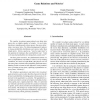Free Online Productivity Tools
i2Speak
i2Symbol
i2OCR
iTex2Img
iWeb2Print
iWeb2Shot
i2Type
iPdf2Split
iPdf2Merge
i2Bopomofo
i2Arabic
i2Style
i2Image
i2PDF
iLatex2Rtf
Sci2ools
114
click to vote
LICS
2007
IEEE
2007
IEEE
Game Relations and Metrics
We consider two-player games played over finite state spaces for an infinite number of rounds. At each state, the players simultaneously choose moves; the moves determine a successor state. It is often advantageous for players to choose probability distributions over moves, rather than single moves. Given a goal (e.g., “reach a target state”), the question of winning is thus a probabilistic one: “what is the maximal probability of winning from a given state?”. On these game structures, two fundamental notions are those of equivalences and metrics. Given a set of winning conditions, two states are equivalent if the players can win the same games with the same probability from both states. Metrics provide a bound on the difference in the probabilities of winning across states, capturing a quantitative notion of state “similarity”. We introduce equivalences and metrics for two-player game structures, and we show that they characterize the difference in probability of winnin...
Related Content
| Added | 04 Jun 2010 |
| Updated | 04 Jun 2010 |
| Type | Conference |
| Year | 2007 |
| Where | LICS |
| Authors | Luca de Alfaro, Rupak Majumdar, Vishwanath Raman, Mariëlle Stoelinga |
Comments (0)

